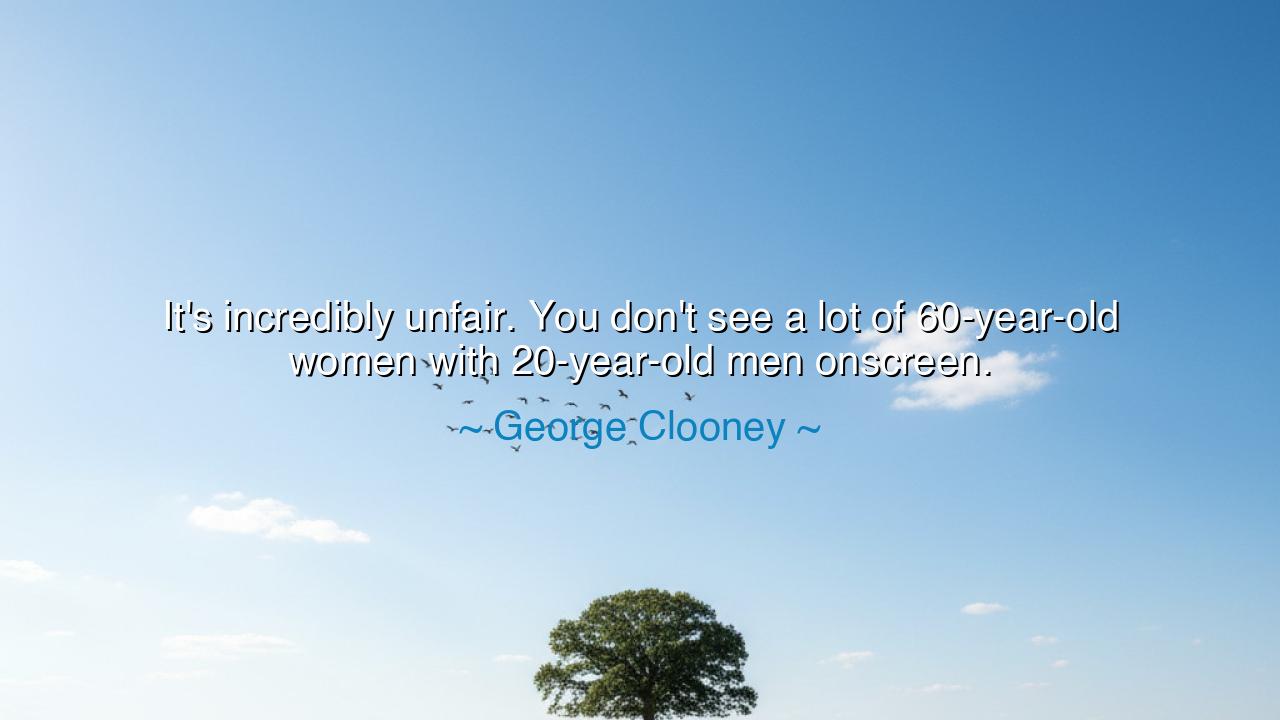
It's incredibly unfair. You don't see a lot of 60-year-old women
It's incredibly unfair. You don't see a lot of 60-year-old women with 20-year-old men onscreen.






When George Clooney lamented, “It’s incredibly unfair. You don’t see a lot of 60-year-old women with 20-year-old men onscreen,” he spoke not of fantasy alone, but of the great imbalance carved into the stage of culture. His words unveil the injustice of perception: that men are permitted to age and still be paired with youth, while women are too often cast aside, their radiance dimmed not by time but by prejudice. It is a cry against a mirror that reflects not truth, but bias.
The ancients knew this cruelty too. In their epics, heroes aged into wisdom, their silver hair a crown of honor. Yet goddesses, queens, and maidens were forever depicted in unchanging beauty, as though time itself dared not touch them—or else banished them from the tale. Clooney’s words expose that this ancient expectation lingers still: the world grants men the dignity of longevity but denies women the same grace.
History offers many such examples. Consider Sarah Bernhardt, the great French actress, who defied conventions by playing roles far younger than her years, even well into her seventies. Critics mocked her, audiences questioned her, yet she triumphed, proving that art should not bow to the false gods of age. Still, her struggle revealed the very unfairness Clooney names: for male actors her age, the same roles would have been offered without hesitation.
The deeper lesson in his words is not about cinema alone, but about how societies value or dismiss women as they age. To relegate them to invisibility is to rob humanity of wisdom, experience, and the beauty that transcends youth. If men may stand tall as mentors, leaders, and lovers at sixty, why should women be denied that same space? Clooney’s lament becomes a call for balance, for equity in how stories are told and lives are honored.
Thus let us carry this truth: unfairness corrodes not only art but society itself. The worth of a person is not measured by the number of their years, nor should their role in the story fade because of them. Let us, then, create a world where the fire of both men and women is celebrated in every season of life, where age is not a curtain that falls, but a stage upon which new acts of beauty and power are revealed.






SHSim Hoang
This quote really speaks to the ongoing gender inequality in the entertainment industry. Older men are often cast in roles where they are paired with younger women, while older women rarely get such opportunities. This pattern has implications not just for actresses but for society at large, reinforcing damaging stereotypes. Is the entertainment industry starting to recognize this imbalance, or are we stuck in these outdated tropes?
APAnh Pham
Clooney’s comment reflects a frustrating reality that Hollywood has yet to change. It’s unfair that women are expected to be forever youthful to be seen as desirable, while men are allowed to age naturally and still be considered romantic leads. What can be done to break these patterns, and why has it taken so long for this issue to gain traction in discussions of gender equality in media?
NLNguyen Hoang Ngoc Linh
It’s frustrating that Hollywood still seems to have these old-fashioned views on aging, particularly for women. The idea that a woman’s appeal or desirability decreases with age, while a man’s can increase, feels outdated. I wonder how much this contributes to self-esteem issues for women in the real world. Why aren’t more movies showcasing relationships where older women are paired with younger men?
DNDuc Nguyen
I appreciate Clooney pointing this out because it brings attention to a longstanding issue in media representation. While there may be some token examples, the fact remains that the majority of older male actors are still paired with younger actresses. It’s strange to think about how this shapes our understanding of age and relationships. Why are we so quick to accept these imbalances as 'normal' in media?
PLle phuong linh
This quote highlights a significant problem in the entertainment industry. Why is there such a difference in the way older men and women are portrayed? It's not just unfair; it's harmful to perpetuate the idea that women lose value with age, whereas men are seen as more distinguished as they get older. Could this reflect broader societal attitudes towards aging and gender roles that need to be challenged?